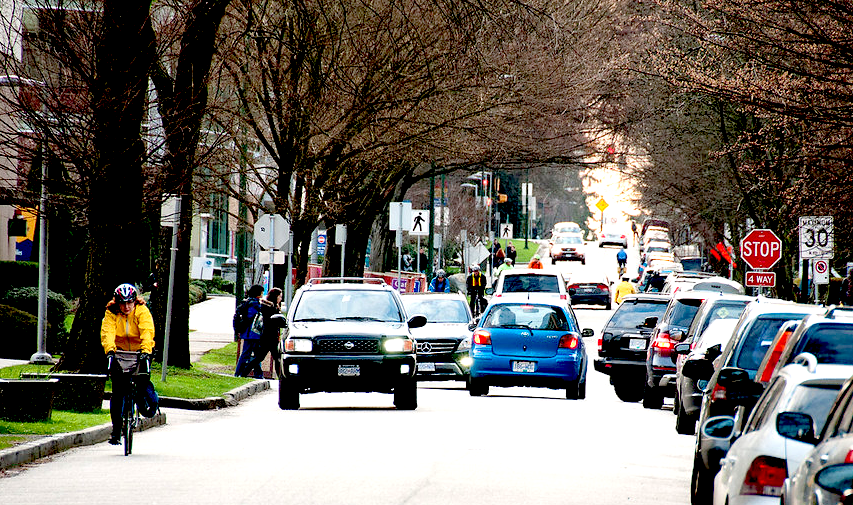April 7, 2023 - Rob Fleming, B.C. Minister of Transportation and Infrastructure, tabled Bill 23, which proposes changes to the act, in the legislature on Wednesday, April 5, 2023.

“Making our roads safer for everyone while enabling new and emerging transportation technology, especially personal mobility devices, is changing the way people and goods move safely around our cities and towns,” Fleming said. “This legislation requires drivers to use appropriate care around pedestrians and cyclists, supports enforcement of regulations, and sets a strong foundation for testing and evaluating new technology and policies as we shift to a net-zero future in B.C.”
These changes are part of government’s Clean Transportation Action Plan to be released later this year, which will put forward a comprehensive plan to enable more modes of transportation to shift people out of cars and reduce vehicle kilometres travelled. The amendments represent additional steps government is taking to meet CleanBC: Roadmap to 2030 emissions reduction targets, including increasing the share of trips made by active transportation, such as walking and cycling, to 30%, and decreasing greenhouse gas (GHG) emissions in transportation by 27% to 32%.
“HUB Cycling is pleased to see the introduction of a minimum safe-passing distance law and other protections for vulnerable road users,” said Erin O’Melinn, executive director, HUB Cycling. “The majority of local residents cycle regularly or want to cycle but are held back by safety concerns. This is an important step to making all road users safer and to providing comfortable options for people to get around using active, healthy, affordable, sustainable modes of transportation.”
Bill 23 proposes amendments to create a safer environment for vulnerable road users, such as cyclists and pedestrians, and supports the shift to increased active transportation with changes that include:
establishing a new vulnerable road-user framework that requires drivers to take proper precautions when pedestrians and cyclists are using a roadway;
implementing a one-metre minimum safe-passing distance and a three-metre minimum following distance that drivers of motor vehicles must observe when sharing roadways with pedestrians, cyclists, e-bikes and other similar devices;
requiring the use of speed-limiter equipment to regulate the maximum speed of heavy-duty commercial vehicles, decreasing GHG emissions, reducing speed-related crashes and making it safer for all road users; and
expanding the Province’s authority to implement more pilot projects, including enabling provincewide pilot projects and broader regulation-making authority to test safe, new and emerging transportation technologies and road safety policies.
“The BCTA is pleased to see the Province take action today to address safety concerns while providing more pathways to adopting advancing transportation technologies,” said Dave Earle, president and CEO of the BC Trucking Association. “We’ve advocated for speed limiters on heavy-duty commercial vehicles because the data shows they dramatically reduce the number of at fault speed-related accidents. Additionally, speed limiters help green our sector by curbing fuel consumption and emissions generated by trucks travelling at high speeds. These amendments will benefit the trucking industry and British Columbians as a whole.”
The proposed legislation will also enable B.C. to regulate automated vehicles, including licensing, insurance, prohibition and permitting, to support research, testing and use of these vehicles on roadways. While highly and fully automated vehicles are not currently authorized for manufacture or sale under federal law, this amendment to the regulatory structure for automated vehicles would align B.C. with Ontario, Quebec and other jurisdictions preparing for the future safe deployment of all classes of automated vehicles if they become authorized by the federal government.
Amendments are also proposed to enable the safe use of a broader range of emerging technologies, such as micro-utility delivery robots and personal mobility devices, to help transform the province’s transportation network to include more clean and affordable options for people and goods movement on B.C.’s roads.
Quotes:
George Heyman, Minister of Environment and Climate Change Strategy –
“These Motor Vehicle Act amendments will create a safer environment for pedestrians, cyclists and other road users, and will also support people to shift toward active transportation and public transit. Transportation accounts for a total of 40% of our annual greenhouse gas emissions. Actions that reduce these emissions have a wide range of benefits, from cleaner air and less congestion to better health and walkable, accessible communities.”
Dan Coulter, Minister of State for Infrastructure and Transit –
“A major part of shifting to a low-carbon economy is ensuring people have safe alternatives to get where they’re going. By tabling these amendments we’re advancing our CleanBC goals while putting the safety of people and communities first.”
















